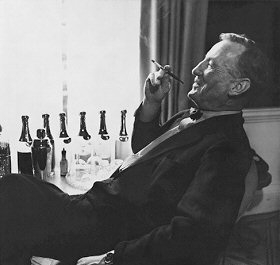Bond. James Bond.
Ian Fleming did more than create a fictional character named James Bond. He was the creative spark that
ignited an industry of films, songs, and spy culture that has spread around the globe. The night before
his assassination, President Kennedy was reading a James Bond novel. So was Lee Harvey Oswald. 007 is one
of the most recognized symbols in the world.
 The success of Fleming's books is due, in part, to the suspense and the exciting subject matter. But another large
part of Fleming's genius is his often overlooked fondness for sumptuous detail. Not only was Fleming
passionate about getting
the details right, but more often than not the details he includes are those
that excite the senses and reflect a world in which pleasure for the sake of pleasure is
the goal of life.
The success of Fleming's books is due, in part, to the suspense and the exciting subject matter. But another large
part of Fleming's genius is his often overlooked fondness for sumptuous detail. Not only was Fleming
passionate about getting
the details right, but more often than not the details he includes are those
that excite the senses and reflect a world in which pleasure for the sake of pleasure is
the goal of life.
As a matter of fact, Fleming, the lastborn of two boys, was a Sybarite, a writer devoted to luxury and pleasure. He retired to a hideaway on Jamaica's North Coast after the Second World War, and there he wrote the books that made his reputation. Casino Royale was the first, followed by eleven more Bond novels. While in Jamaica, Fleming used a gold-plated Royal de Luxe typewriter, smoked Morland Specials incessantly, and drank to excess. His appreciation of the pleasures of life was mirrored in his literary style, which relied on generous descriptive passages, exotic settings, and colorful characters. The Fleming style, which he consciously adopted and employed in all his work, includes details calculated to excite the senses and give readers a taste of luxury and hedonism. In order to write like Ian Fleming, try using some of the techniques he found so effective:
- Describe food in detail, but make sure it's good food.
- Have your characters drink plenty of alcohol.
- Include sensuous details about clothes.
- Let your characters take time to relax and enjoy themselves now and then.
These techniques are evident on almost every page of Fleming's novels.
 I just opened From Russia With Love at random and came upon the scene in which Bond is
sitting in
Darko Kerim's office in Istanbul. "There was a knock on the door and the head clerk put
a china eggshell, enclosed in gold filigree, in front of
each of them and went out. Bond sipped his coffee and put it down. It was good, but thick with
grains." The passages I underlined contain the kind of sensuous detail that Fleming is famous for.
Little touches like this add a realistic feel to every scene — but this is more than simple realism
in the style of Zola or Sinclair Lewis, writers who drag us down into the mire of life at its
worst. Fleming's sensuous details elevate the mood, stimulate the senses, and
invite us, vicariously, to taste life at its best. You can use the same techniques in your fiction and
nonfiction to add vitality to your work. You may not be writing about
James Bond, but your characters can certainly live the sensuous life — to their benefit
and to the delight of all your readers.
I just opened From Russia With Love at random and came upon the scene in which Bond is
sitting in
Darko Kerim's office in Istanbul. "There was a knock on the door and the head clerk put
a china eggshell, enclosed in gold filigree, in front of
each of them and went out. Bond sipped his coffee and put it down. It was good, but thick with
grains." The passages I underlined contain the kind of sensuous detail that Fleming is famous for.
Little touches like this add a realistic feel to every scene — but this is more than simple realism
in the style of Zola or Sinclair Lewis, writers who drag us down into the mire of life at its
worst. Fleming's sensuous details elevate the mood, stimulate the senses, and
invite us, vicariously, to taste life at its best. You can use the same techniques in your fiction and
nonfiction to add vitality to your work. You may not be writing about
James Bond, but your characters can certainly live the sensuous life — to their benefit
and to the delight of all your readers.